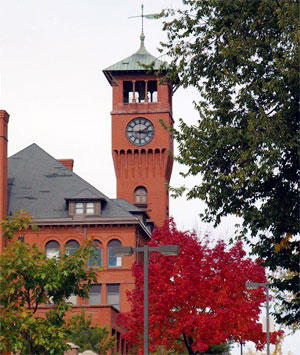
The college town occupies a special place in the American consciousness. Small, leafy, brimming with intellectual activity, preparing tomorrow’s leaders – if we haven’t spent years, dropped off kids, or attended a football game in a college town, we have at least passed through one.
But nothing lasts forever and nostalgia is not the surest guide to the future. Colleges claim their presence brings great benefits to their surrounding regions. Many conduct studies to quantify these benefits, and several come up with figures in the billions of dollars (you can Google the subject for examples).
Hundreds of articles proclaim the college town as the retiree’s ideal. You can walk on campus! Take workshops! Audit classes!
Forbes magazine editor Rich Karlgaard has written extensively about college towns being excellent places to start and run small businesses. Available, affordable, high-skill labor! Amenities! Good coffee and wine! Low cost of living (a place where even I can afford to belong to the country club)!
And every down-on-its luck town wants to become a college town to attract population, businesses and jobs; they dream of becoming the next Silicon Valley, or at least Alley, by providing just the right mix of public policy and social/cultural atmosphere.
In fact, college towns are stifling, boring, and obsolescent.
Colleges and college towns have become bastions of intolerance and enforced conformity. Political correctness? That’s not the tenth of it. I’m talking about the stifling of speech, dissent, or any deviation from orthodoxy. Colleges have gone from citadels of intellectual openness to dungeons of intellectual coercion. And in support of what? High ideals such as the canons of Western thought (freedom, liberty, justice, sovereignty of the individual, the inviolability of property rights)? More often, it’s the undermining of the same.
If this is news to you, you haven’t been paying attention, and you certainly haven’t experienced being flunked for your views (not your scholarship), having your perfectly reasonable points of view confiscated and trashed and/or burned (if they appeared in print), being shouted down, prevented from gaining a hearing, or having your audiences intimidated and threatened, your tenure denied, your application rejected, or your grant stripped.
[Consult www.Studentsforacademicfreedom.org, or see the film, "Indoctrinate U.”]
Secondly, for most people college is a waste of time and money. As Charles Murray points out:
College is not all it is cracked up to be. Dumbed-down courses, flaky majors, and grade inflation have conspired to make the term B.A. close to meaningless. Another problem with today's colleges is more insidious: they are no longer good places for young people to make the transition from childhood to adulthood. Today's colleges are structured to prolong adolescence, not to midwife maturity.
In fact, the entire American system of post-secondary education is wasteful; Murray calls it cruel and insane. The four years and thousands of dollars you spent in that college town to earn a bachelor’s degree in a field such as sociology, psychology, economics, history or literature certifies little and qualifies you for less.
Advances in technology are also making the brick-and-mortar facility increasingly irrelevant. Distance learning, remote learning – call it what you will – will doom the college town. The Internet renders the college library unnecessary; CDs and DVDs obsolete the 8 AM lecture; email and other advanced communication capabilities make office hours unneeded. Giving up the trappings of a campus will reduce costs dramatically, particularly in an era of high energy prices. Once higher education is exposed to market forces, the rationalization of education will be rapid and profound.
Of course college towns will still exist: after all, there are still football, hockey and basketball games. There will just be far fewer of them.
Roger Selbert is a business futurist and trend guy. He lives in Los Angeles, edits and publishes the newsletter Growth Strategies, speaks and consults [www.rogerselbert.com]. He graduated from Bowdoin College in 1973, missed his graduation ceremony and has yet to return. But he thinks Brunswick, Maine was a great college town.













Today anyone can get a
Today anyone can get a online degree and more colleges should start to offer some classes online and expand their reach to get more students
Wow!
Let's toss that hand grenade into the middle of the discussion.
Interesting commentary and definitely multiple sigmas away from the mean.
Dave Barnes
+1.303.744.9024
http://www.MarketingTactics.com